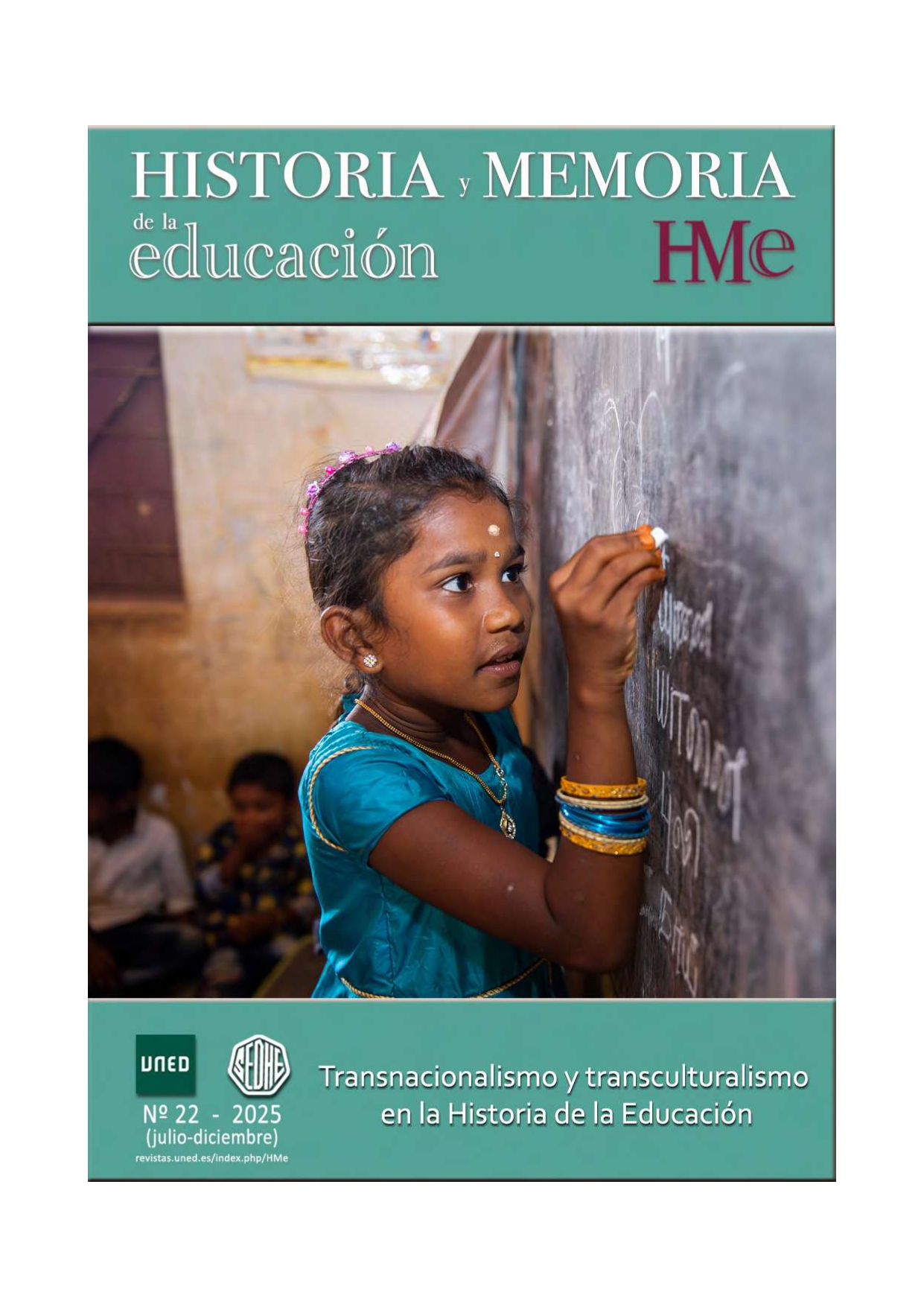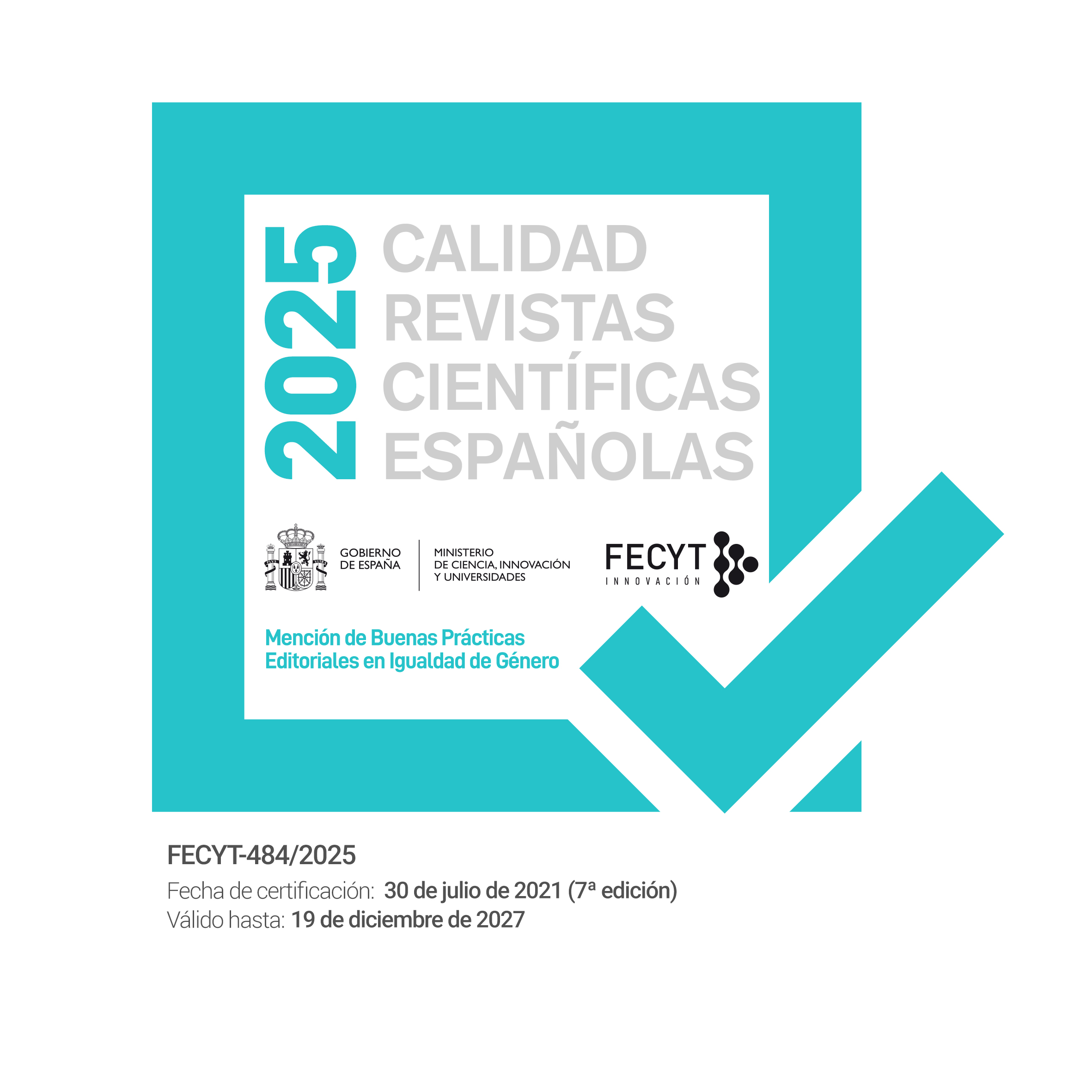The «female school teacher's profile» promoted by educational literature in elizabethan Spain
DOI:
https://doi.org/10.5944/hme.22.2025.37501Keywords:
professionalization of the female teacher, female education, Spain, XIX centuryAbstract
The present work investigates the conception of the female teaching profession at the time of its emergence in Spain, which occurred in the central section of the 19th century, during the reign of Isabel II. For this purpose, we use the analysis of the discourse expressed in the manuals intended for their formation, taking into consideration three main dimensions: considerations of a social nature about the female school teacher, nature of her training and conception within the labor framework. The maternal attributions with which the female magisterial figure was clothed, used to justify the presence of women in a field that until now had been exclusively male, are also attributed to guide the conditions with which their incorporation into it was allowed. The figure of the teacher will be defined in attention to her supposed condition as a woman, dominant essentialist and naturalized, following the canons of the feminine ideal formulated by the bourgeoisie. Thus, impelled to train good future mothers and wives through not only words, but fundamentally example, literature imprisoned the profile of the teacher within the mold of the feminine archetype of self-denial, modesty and submission that they were called to reflect and impart, configuring for them a devalued professional model, both at the training and remunerative level.
Downloads
References
Ballarín, Pilar. «Dulce, buena, cariñosa… En torno al modelo de maestra/madre del s.XIX». En El modelo femenino: ¿una alternativa al modelo patriarcal?, editado por Inés Calero Secall y María Dolores Fernández de la Torre Madueño, 69-88. Málaga: Atenea, 1996.
Ballarín, Pilar. «Maestras, innovación y cambios». Arenal 6, no. 1 (1998): 81-110. https://doi.org/10.30827/arenal.v6i1.16936
Ballarín, Pilar. «La escuela de niñas en el siglo XIX. La legitimación de la sociedad de esferas separadas». Historia de la educación 26 (2007): 143-168.
Ballarín, Pilar. La educación de las mujeres en la España contemporánea (siglos XIX-XX). Madrid: Síntesis, 2008.
Ballarín, Pilar. «Nuestras predecesoras en el magisterio: una mirada al pasado para construir futuro». En I Jornadas sobre igualdad y género, coordinado por Vicente Marín Parra y Remedios Fortes Ruiz, 11-32. Ceuta: Universidad de Granada, 2011.
Borderías, Cristina. «El trabajo de las mujeres: discursos y prácticas». En Historia de las mujeres en España y América Latina III, dirigido por Isabel Morant, 353-379. Madrid: Cátedra, 2006.
Burguera, Mónica. «El ámbito de los discursos: reformismo social y surgimiento de la “mujer trabajadora”». En Historia de las mujeres en España y América Latina III, dirigido por Isabel Morant, 293-311. Madrid: Cátedra, 2006.
Cortada, Esther. «Hostilidad, negociación y conciencia profesional: el día a día de las maestras del siglo XIX». Ayer 45, no. 1 (2002): 223-250.
Escolano, Agustín. «El manual escolar y la cultura profesional de los docentes». Tendencias pedagógicas 14 (2009): 169-180.
Espín Templado, María Pilar. «“Coqueta, Politicómana, y Marisabidilla”: tres tipos de mujer sin fronteras». En La península romántica: el Romanticismo europeo y las letras españolas del XIX, coordinado por José María Ferri Coll y Enrique Rubio Cremades, 175-192. Palma de Malloraca: Genueve, 2014.
Flecha, Consuelo. «Currículum para maestras y construcción de un modelo de feminidad». En El currículum: historia de una mediación sociocultural, 47-55. Granada: Osuna, 1996.
Flecha, Consuelo. «La mujer en el Magisterio». Revista TAVIRA 26 (2010): 273-295.
Freire, Paulo. Cartas a quien pretende enseñar. Madrid: Siglo XXI, 2010.
Gabriel, Narciso. «La mujer como educadora». En Mujeres y educación en España. 1868-1975, 437-448. Santiago de Compostela: Universidad de Santiago de Compostela, 1990.
Gabriel, Narciso. «Guías e libros do mestre en España (1850-1939)». Sarmiento 1 (1997): 111-126.
Gómez-Ferrer Morant, Guadalupe. Historia de las mujeres en España: siglos XIX y XX. Madrid: Arco, 2011.
González Pérez, Teresa. «Aprender a enseñar en el siglo XIX. La formación inicial de las maestras españolas». REIFOP 13, no. 4 (2010): 133-143.
Jiménez Morales, María Isabel. «Los españoles pintados por sí mismos (1843-1844): Una mirada masculina al universo femenino». Aldaba 28 (1996): 285-300. https://doi.org/10.5944/aldaba.28.1996.20395
Martínez Vilches, David. «Sine labe concepta. La proyección de un modelo de feminidad católica a través de la Inmaculada Concepción en la España del siglo XIX». Arenal 27, no. 2 (2020): 495-518. https://doi.org/10.30827/arenal.v27i2.6769
Méndez Vázquez, Josefina y Francisco Chacón Jiménez (eds.). Historiar la educación de las mujeres en tiempos de cambio (siglos XVII-XX). Granada: Editorial Comares, 2020.
Nash, Mary. Mujeres en el mundo. Historia, retos y movimientos. Madrid: Alianza, 2012.
Puelles Benítez, Manuel. «Los manuales escolares: un nuevo campo de conocimiento». Historia de la Educación 19 (2000): 5-11.
Rabaté, Colette. ¿Eva o María? Ser mujer en la época isabelina (1833-1868). Salamanca: Universidad de Salamanca, 2007.
Rabazas, Teresa. «La política educativa y su repercusión en la pedagogía normalista de la segunda mitad del siglo XIX». En El libro escolar, reflejo de intenciones políticas e influencias pedagógicas, editado por Alejandro Tiana, 283-303. Madrid: UNED, 2012.
Ríos Lloret, Rosa Elena. «Sueños de moralidad». En Historia de las mujeres en España y América Latina III, dirigido por Isabel Morant, 181-206. Madrid: Cátedra, 2006.
Ramos Zamora, Sara. «Una mirada a la educación de las mujeres en el convulso siglo XIX». En Historiar la educación de las mujeres en tiempos de cambio (siglos XVII-XX), editado por Josefina Méndez Vázquez y Francisco Chacón Jiménez, 133-151. Granada: Editorial Comares, 2020.
Romeo Mateo, María Cruz. «Destinos de mujer: esfera pública y políticos liberales». En Historia de las mujeres en España y América Latina III, dirigido por Isabel Morant, 61-83. Madrid: Cátedra, 2006.
San Román, Sonsoles. Las primeras maestras. Los orígenes del proceso de feminización docente en España. Barcelona: Ariel, 1998.
Viñao, Antonio. «El sistema educativo español: evolución histórica». En Procesos y contextos educativos: enseñar en las instituciones de educación secundaria, coordinado por Francisco Imbernón, 13-33. Barcelona: Grao, 2010.
Downloads
Published
How to Cite
Issue
Section
License
Copyright (c) 2024 Historia y Memoria de la Educación

This work is licensed under a Creative Commons Attribution-NonCommercial 4.0 International License.
Authors who publish in Historia y Memoria de la Educación agree to the following terms:
- Authors retain copyright and grant the journal right of first publication with the work simultaneously licensed under a Creative Commons Attribution-NonCommercial 4.0 International that allows others to share the work with an acknowledgement of the work's authorship and initial publication in this journal.
- Authors are able to enter into separate, additional contractual arrangements for the non-exclusive distribution of the journal's published version of the work (e.g., post it to an institutional repository or publish it in a book), with an acknowledgement of its initial publication in this journal.
- Authors are permitted and encouraged to post their work online (e.g., in institutional repositories or on their website) prior to and during the submission process, as it can lead to productive exchanges, as well as earlier and greater citation of published work (See The Effect of Open Access).












